Commonwealth Scientific and Industrial Research Organisation (CSIRO) scientists are working on a sterile insect technology and new trapping systems to rid farms across Australia of the Queensland fruit fly which is threatening to destroy the nation’s A$6.9 billion horticultural industry.

The tiny Q-fly is a highly mobile insect capable of infecting various fruit and vegetable crops, including stone and tropical fruits.
According to the news release by CSIRO, farmers used agri-chemicals such as dimethoate and fenthion to battle the Q-fly before the Australian Pesticides and Veterinary Medicines Authority restricted the use of these insecticides.
CSIRO researcher Dr Paul De Barro says increased Q-fly numbers can also threaten status of pest free areas.
“We believe that our sterile insect technology (SIT), through development of a male-only line of Q-fly, will offer a new environmentally friendly, sustainable and cost effective approach to assist in managing this damaging pest,” Dr De Barro said.
“SIT is a scientifically proven method for suppressing or eradicating fruit fly populations and managing their potential impacts in horticulture production areas.”
Dr De Barro said that they still had to do a lot of learning about the behaviour and breeding places of the Q-flies before deploying sterile male flies to disrupt their mating cycle. According to him, CSIRO will use its micro sensing technology on Q-flies to understand where to deploy sterile Q-flies and also how to make better use of other management options such as new trapping systems and pheromone baits.
“It will tell us how many sterile flies we will need to release and most importantly, when to release them,” Dr De Barro said.
“Combining SIT with other sensor technologies represents a game-changing opportunity as it not only provides us with information about how the Q-fly interacts with its natural environment, but offers real opportunities to reduce the cost of current monitoring networks for fruit fly.”
Horticulture Australia Limited’s David Moore, General Manager R&D Services, says the initiative was the first effort in a long time at investing in medium to long term research that would provide a sustainable solution to Australia’s fruit fly problem and its impact on production and market access.
“There is still a lot of work to be done but compared to examples of overseas best practice along with the shared vision and dedicated support of key investors and industry, we’re confident that this project will deliver real impact for Australian farming communities,” Mr Moore said.


















